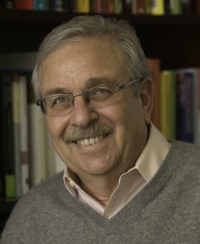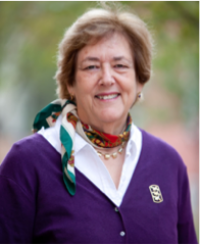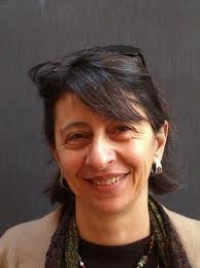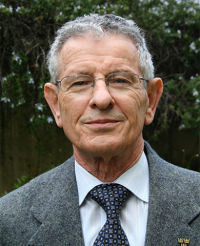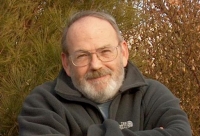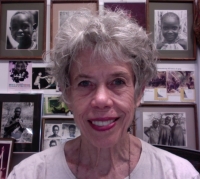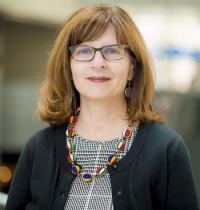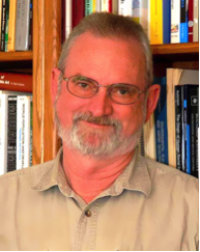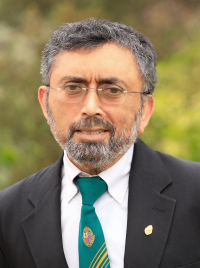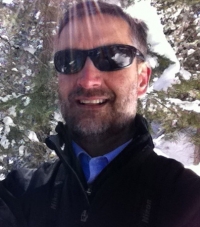Culture-Gene Interactions in Human Origins
Biographical Sketches: Co-Chairs
Stony Brook University (State University of New York)
Mark Aronoff is a Trustees Distinguished Professor of Linguistics at Stony Brook University (State University of NY), where he has taught ever since receiving his Ph.D. from MIT. His major academic interests have been linguistic morphology, writing systems, undergraduate education, and sign language. His research has been funded by the National Endowment for the Humanities, the National Science Foundation, and the National Institutes of Health, as well as foreign and non-governmental agencies. He is a Fellow of the American Academy of Arts and Sciences, the American Association for the Advancement of Science, and the Linguistic Society of America. He has served as President of the LSA and editor of its journal, Language. For over a decade, he has worked with Irit Meir, Carol Padden, and Wendy Sandler on Al-Sayyid Bedouin Sign Language.
University of Pennsylvania, Perelman School of Medicine
Sarah Tishkoff is the David and Lyn Silfen University Professor in Genetics and Biology at the University of Pennsylvania, holding appointments in the School of Medicine and the School of Arts and Sciences. She is also the Director of the Penn Center for Global Genomics & Health Equity in the Department of Genetics and serves on the CARTA External Advisory Board.
Dr Tishkoff studies genomic and phenotypic variation in ethnically diverse Africans. Her research combines field work, laboratory research, and computational methods to examine African population history, the genetic basis of anthropometric, cardiovascular, and immune-related traits, and how humans have adapted to diverse environments and diets.
Dr Tishkoff is a member of the National Academy of Sciences, the American Academy of Arts and Sciences, and the National Academy of Medicine. She is a recipient of an NIH Pioneer Award, a David and Lucile Packard Career Award, a Burroughs/Wellcome Fund Career Award, the ASHG Curt Stern Award, and a Penn Integrates Knowledge (PIK) endowed chair. She is on the NAS Board of Global Health and the Scientific Advisory Board for the Packard Fellowships in Science and Engineering, and is on the editorial boards at Cell, PLOS Genetics, and G3 (Genes, Genomes, and Genetics).
Her research is supported by grants from the National Institutes of Health, the Chan Zuckerberg Institute, the American Diabetes Association, and the Pennsylvania Department of Health.
Biographical Sketches: Speakers
George Washington University
Alison S. Brooks is a professor of anthropology and international affairs at the George Washington University and a founding member of the Center for the Advanced Study of Hominid Paleobiology (CASHP). In addition, she is a research associate in the Human Origins Program at the National Museum of Natural History, Smithsonian Institution, a visiting researcher at Harvard University and a fellow of the American Academy of Arts and Sciences. She received her PhD from Harvard in 1979 for research on the initial Upper Paleolithic occupation of Western Europe. As the origins of these first “anatomically modern” Europeans clearly lay outside that continent, her fieldwork has explored the Pleistocene prehistory of multiple African countries. These include Botswana, where she studied the lifeways of San hunter-gatherers and documented their long-term history, Zimbabwe, D.R. Congo, Ethiopia, Kenya, Tanzania and South Africa. Her African work focuses on defining and dating the Middle Stone Age of Africa and understanding both cultural diversification within Africa and the cognitive and behavioral transformations that led to the expansion of our species throughout the world. She was instrumental in developing chronometric techniques for sites that are too old for radiocarbon, and in documenting the oldest evidence for fishing technologies and projectile weapons, as well as early evidence for the expansion of social networks and symbolic behavior, and the first evidence that starch grains were preserved in the dental calculus of fossils from Africa, the Near East and Europe, allowing us to reconstruct the plant segment of their diets. She is co-editor of The Encyclopedia of Human Evolution and Prehistory and her scholarly papers include “The Revolution That Wasn’t: A New Interpretation of the Origin of Modern Human Behavior” with Sally McBrearty in the Journal of Human Evolution (2000).
University of Chicago
Anna Di Rienzo is a professor emerita in the Department of Human Genetics at the University of Chicago. Dr. Di Rienzo’s research interests deal with the characterization of genetic variation in humans, the elucidation of the forces shaping and maintaining this variation, and the integration of knowledge from evolutionary and disease mapping studies to help dissect the genetic bases of common diseases and variable drug response. The recent availability of large-scale human variation data has allowed the detection of signals of natural selection on a genome scale and the delineation of the most important selective pressures that acted in humans. At the same time, high-throughput genotyping platforms applied to disease association studies hold great promise for the identification of new susceptibility variants for common diseases. A major theme of the work done in her lab is to link these areas of inquiry and to place the study of common disease phenotypes within a rigorous population genetics framework. To complement the above genome-wide efforts, she performs detailed studies of single genes or groups of genes within pathways; these studies are characterized by a tight connection between population genetics theory, empirical data collection and analytical methods that take into account the complexity of the data. By rooting our analyses deeply into the biology of the genes of interest, she aims to obtain novel insights and generate new models with general applicability.
Stanford University
Marcus Feldman, Ph.D., is the Wohlford Professor of Biology at Stanford University and External Professor at the Santa Fe Institute. He directs the Morrison Institute for Population and Resource Studies and is co-director of Stanford’s Center for Computational, Evolutionary and Human Genomics. Feldman’s specific areas of research include the evolution of complex genetic systems that can undergo both natural selection and recombination, the evolution of modern humans using models for the dynamics of molecular polymorphisms, especially DNA variants, cultural evolution, and the evolution of learning as one interface between modern methods in artificial intelligence and models of biological processes, including communication. He is the author of more than 600 scientific papers and ten books on evolution, ecology, mathematical biology, and demography. He is a member of the U.S. National Academy of Sciences, the American Academy of Arts and Sciences, and the American Philosophical Society. He was the 2011 Dan David laureate in Evolution and was awarded the 2016 Kimura Prize in Evolution by the Japanese Suzuki Foundation.
University of Utah
Henry Cosad Harpending (January 13, 1944 – April 3, 2016) was an American anthropologist, population geneticist and Distinguished Professor at the University of Utah. Harpending received his A.B. degree from Hamilton College and his Ph.D. from Harvard University in 1972. He was a member of the National Academy of Sciences. Harpending studied genetic and morphometric variation within and between human populations with mathematical models, examining hypotheses such as population growth, divergence, and gene flow. Harpending did extensive fieldwork in Southern Africa (Botswana, Namibia) and spoke the !Kung language fluently. In The 10,000 Year Explosion, which he co-authored with Gregory Cochran, Harpending suggests a common belief that human genetic adaptation stopped 40,000 years ago is incorrect and that humans evolved increasingly rapidly in response to the new challenges presented by agriculture and civilization. The result was accelerating evolution which has varied according to new niches or environments that particular populations inhabit.
University of Utah
Kristen Hawkes is Distinguished Professor of Anthropology at the University of Utah. Her principle interests are the evolutionary ecology of hunter-gatherers and human evolution. She studies age and sex differences in behavior, using comparisons between people and other primates, paleoanthropology and evolutionary modeling to develop and test hypotheses about the evolution of human life histories and social behavior. Hawkes has pursued ethnographic fieldwork in highland New Guinea, Amazonia, and eastern and southern Africa. She is a member of the Scientific Executive Committee of the Leakey Foundation, the American Academy of Arts and Sciences, and the National Academy of Sciences.
University of California, San Diego
Carol Padden is the Sanford I. Berman Endowed Professor of Communication and Dean of Social Sciences at the University of California, San Diego. She has published on language emergence, culture and genes, comparative sign language structure, and reading in deaf children. With Tom Humphries, she is the co-author of four books on culture and community of deaf people in the United States. In recent years, she and her research team have been studying new sign languages in Israel and Turkey and documenting the spontaneous emergence of language in small communities. She is most recently involved in a collaborative effort to adapt depth-sensing cameras and video data analysis tools (i.e., Microsoft Kinect cameras and ChronoViz) for purposes of quantitative measures of movement-based language and communication, including for gesture and sign languages. Her work has been supported by: the U.S. Department of Education, the Spencer Foundation, the National Science Foundation and the National Institutes of Health. In 1992 she was awarded a John D. Simon Guggenheim Fellowship, and in 2010, a John D. and Catherine T. MacArthur Foundation Fellowship. She was elected Fellow of the Linguistic Society of America and the American Association for the Advancement of Science.
University of California, Davis
Peter J. Richerson is a Distinguished Professor Emeritus in the Department of Environmental Science and Policy at the University of California—Davis. His research focuses on the processes of cultural evolution. His 1985 book with Robert Boyd, Culture and the Evolutionary Process, applied the mathematical tools used by organic evolutionists to study a number of basic problems in human cultural evolution. His 2005 book with Boyd, Not By Genes Alone: How Culture Transformed Human Evolution, is an introduction to cultural evolution aimed at a broad audience. His recent publications try to understand some of the main events in human evolution, such as the evolution of the advanced capacity for imitation that makes possible our complex languages, technologies and societies, the origins of agriculture, and the evolution of modern behavior.
UC San Diego School of Medicine
Ajit Varki is a Distinguished Professor of Medicine and Cellular & Molecular Medicine, Emeritus Co-Director of CARTA, Emeritus Co-Director of the Glycobiology Research and Training Center at UC San Diego, and Adjunct Professor at the Salk Institute. He received basic training in physiology, medicine, biology, and biochemistry at the Christian Medical College (CMC), Vellore, The University of Nebraska, and Washington University in St. Louis. He also has formal training and board certification in internal medicine, hematology, and oncology. Varki is the executive editor of Essentials of Glycobiology (Cold Spring Harbor Press, 4th Edition, 2022) and is recipient of a MERIT award from the NIH, and an American Cancer Society Faculty Research Award. Honorific elections include the American Academy of Arts and Sciences, the National Academy of Medicine, the American Society for Clinical Investigation, and the Association of American Physicians. He is also recipient of the three highest honors in his field, the Karl Meyer Award of the Society for Glycobiology, the International Glycoconjugate Organization Award and the Rosalind Kornfeld Award for Lifetime Achievement in Glycobiology. He is recognized for creating the first major open access research journal (J. Clin. Invest., 1996) as well as the first major open access textbook (Essentials of Glycobiology, 2009). He was honored with the Old Cottonian of Eminence Award at the 150th Anniversary of Bishop Cotton Boys School, Bangalore, India, (2015) as well as a Distinguished Faculty Medal and Oration at his medical school alma mater, CMC, Vellore. Significant past appointments include: Co-Head, UC San Diego Division of Hematology-Oncology; President of the Society for Glycobiology; Editor-in-Chief of the Journal of Clinical Investigation; Interim Director of the UC San Diego Cancer Center, President of the American Society for Clinical Investigation, and UC San Diego Associate Dean for Physician-Scientist Training. Varki's research interests are focused on a family of cell surface sugars called sialic acids, and their roles in biology, evolution and disease. Currently, active projects are relevant to the roles of sialic acids in microbial infectivity, the regulation of the immune response, the progression and spread of tumors, aging, and unique aspects of human evolution. His group is particularly intrigued to find multiple interrelated differences in sialic acid biology between humans and our closest evolutionary cousins, the "great apes." These differences are a signature of the events that occurred during the last few million years of human evolution, and appear to be relevant to understanding several aspects of the current human condition, both in health and disease. Varki’s book, Denial (Twelve, Hachette Books, 2013), explores a novel "Mind Over Reality Transition” (MORT) theory that denying reality and personal mortality was a key step in allowing the emergence of a full theory of mind, and in the origin of our species.
Duke University
Gregory Wray is a professor in the Department of Biology with a secondary appointment in evolutionary anthropology at Duke University. Wray oversees the Center for Evolutionary Genomics and the Genome Sequencing and Analysis Core Resource, both within Duke's Institute for Genome Sciences and Policy. He is actively involved in the Center for Systems Biology and the Primate Genome Initiative at Duke. Wray also serve on the editorial boards of Evolution and Development and the Quarterly Review of Biology and on the Scientific Advisory Board of the Organization for Tropical Studies.
